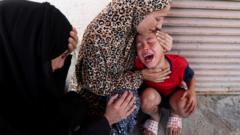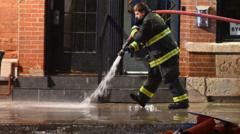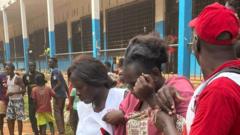Pope Francis, aged 88, demonstrates a stabilizing health condition, but remains hospitalized amidst ongoing concerns regarding his respiratory infections.
Pope Francis' Health Improves, Yet Hospital Stay Extended Amid Concerns

Pope Francis' Health Improves, Yet Hospital Stay Extended Amid Concerns
Vatican reports positive progress for the Pope, but cautions that further treatment is necessary.
Despite significant improvements in his health condition, including a reduced risk of immediate danger from pneumonia, Pope Francis will remain hospitalized for additional treatment, according to a recent statement from the Vatican. The pontiff has been undergoing care since mid-February, following complications associated with breathing difficulties.
The Vatican announced on Monday that Francis's response to medical treatment has been satisfactory, and recent blood tests show stability, allowing the medical team to reassess his previous “guarded” prognosis. The statement from the Vatican emphasized the need for continued care given the complexity of his current health issues.
Francis has actively engaged with Vatican clergy via video, expressing gratitude for the prayers sent by supporters worldwide. In addition, he communicated condolences for victims of flooding in Argentina. Nevertheless, he has encountered various health challenges during his stay, such as choking incidents, the need for blood transfusions, and oxygen therapy, underscoring the precarious nature of his condition.
The Pope's prolonged health issues have caused concern among the Roman Catholic community, prompting nightly prayer vigils in St. Peter's Square as well as international expressions of support. Vatican officials are attempting to mitigate speculation surrounding the pontiff's future, including discussions about potential resignation.
Despite his positive recent developments, the Pope's age and historical health concerns, such as previously diagnosed bronchiectasis and lung surgery, have warranted ongoing caution from his medical team. Experts indicate that each aspect of his health requires careful monitoring as he continues under hospital care.
The Vatican announced on Monday that Francis's response to medical treatment has been satisfactory, and recent blood tests show stability, allowing the medical team to reassess his previous “guarded” prognosis. The statement from the Vatican emphasized the need for continued care given the complexity of his current health issues.
Francis has actively engaged with Vatican clergy via video, expressing gratitude for the prayers sent by supporters worldwide. In addition, he communicated condolences for victims of flooding in Argentina. Nevertheless, he has encountered various health challenges during his stay, such as choking incidents, the need for blood transfusions, and oxygen therapy, underscoring the precarious nature of his condition.
The Pope's prolonged health issues have caused concern among the Roman Catholic community, prompting nightly prayer vigils in St. Peter's Square as well as international expressions of support. Vatican officials are attempting to mitigate speculation surrounding the pontiff's future, including discussions about potential resignation.
Despite his positive recent developments, the Pope's age and historical health concerns, such as previously diagnosed bronchiectasis and lung surgery, have warranted ongoing caution from his medical team. Experts indicate that each aspect of his health requires careful monitoring as he continues under hospital care.





















